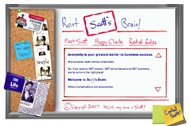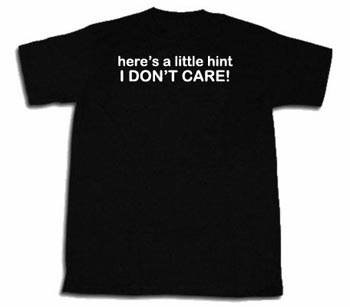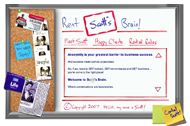
Since this is my final workweek of 2007, I’m going to post a ridiculously long list … every day. Be sure to check back all week!
And, don’t forget to read the other ridiculously long lists in the series:
101 Lessons Learned from 2007
101 Ways to Create a Powerful Web Presence
But for now:
123 Questions Every Marketer Must Ask
1. Are other people telling their friends about you?
2. Are other people repeating your “story”?
3. Are people talking about you?
4. Are the very first words out of your mouth consistent with your brand?
5. Are you broadcasting your brand to the right audience?
6. Are you building things worth noticing right into your product or service?
7. Are you concerned with traffic or transactions?
8. Are you everywhere?
9. Are you giving away enough stuff for free?
10. Are you listening to the word of mouth about you?
11. Are you pushing or pulling your customers?
12. Are you specializing enough?
13. Are you starting positive epidemics?
14. Are you still ripping off that lame-ass “Got milk?” campaign?
15. Are you thinking about your non-customers?
16. Are your products positioned, or do they just have clever slogans?
17. Can your target market afford you?
18. Do people know what you do?
19. Do people know what you’re DOING?
20. Do people know what you’ve DONE?
21. Do you find unusual places to show off?
22. Do you have customers or fans?
23. Do you have them at hello?
24. Do you know which of your marketing efforts have been effective in the past?
25. Do you provide a value message to your customers every week?
26. Do you really think anybody is talking about your yellow page ads?
27. Do your beautiful, award-winning marketing materials actually influence customer decisions?
28. Does a lower fee make you more affordable, or less attractive?
29. Does your website offer proof or just list a bunch of adjectives?
30. Has anybody ever done this before?
31. Have people heard about you?
32. How are you allowing customers to participate in your brand?
33. How are you building a following? (If you’re not presently doing this, send an email to [email protected] and I’d be happy to show you how!)
34. How are you building a permission asset?
35. How are you enabling your customers to do your marketing for you?
36. How are you getting permission from people to market to them?
37. How are you making it easy for customers to tell their friends about you?
38. How are you marketing yourself daily?
39. How are you staying in front of your fans?
40. How can you be visible to the highest number of people?
41. How can you become the best marketer in the world?
42. How can you keep marketing, even when you tell customers no?
43. How can you make yourself more marketable in the next year?
44. How could you encourage strangers to break the silence and talk to you?
45. How do you measure your permission asset?
46. How good are you at attracting attention?
47. How many different ways are you interacting with your market?
48. How many different ways can you leverage this?
49. How many different ways did you leverage your media appearance?
50. How many people anticipate your marketing?
51. How many people do you think really read your press release?
52. How much money do you spend on marketing?
53. How much time do you spend on marketing each day?
54. How often are customers retelling your company’s story?
55. If you have to jump through hoops to defeat someone’s efforts to avoid your advertising, is the result going to be worthwhile?
56. If you have to trick people into looking at your advertising, is the result going to be worthwhile?
57. If you showed your idea to a teenager, what would she think?
58. If you showed your website to a five year old, what would he think?
59. If you stopped advertising, would anybody even notice?
60. If you were your customer, what would you LOVE to have from you next?
61. Is anybody else doing this now?
62. Is your idea simple enough that a five year old could understand it?
63. Is your idea so good that other people are copying it?
64. Is your idea so good that SNL would parody it?
65. Is your idea so remarkable that people make fun of it?
66. Is your marketing interrupting or interacting?
67. Is your marketing making music or noise?
68. Are you creating a website or a destination?
69. Are you sharing link love FIRST?
70. Can your business afford not to have a website?
71. Did you buy the domain first?
72. Did you get their email address?
73. Did you register all of the misspellings and accidental permutations of your URL?
74. Do you have a web-SITE or a web-PRESENCE?
75. Do you really care if your non-customers don’t like your website?
76. Does your website honestly reflect your business personality?
77. Does your Website leave a perception of value or vanity in the mind of a visitor”?
78. Does your website scream, “Look at me!” or “Here’s what you were looking for”?
79. How are you getting customers to come back to your website just to see what you’ve been up to?
80. How are you participating in your online image?
81. How are you taking advantage of the infinite shelf space of the Web?
82. How powerful is your online platform?
83. Is content king on your website?
84. Is your website an experience?
85. Is your website something you can proudly reference?
86. What are the Potential Silent Dialogues when people first come to your website?
87. What makes your website a destination?
88. When someone comes to your website, how do you want them to feel?
89. When someone comes to your website, what’s the ONE THING you want them to do?
90. When was the last time you added new content to your website?
91. When was the last time you bought something from spam email?
92. When was the last time you checked your website stats?
93. When was the last time you Googled a word or idea?
94. When was the last time you Googled somebody?
95. When was the last time you invited your audience to participate at your website?
96. Where are most of your hits coming from?
97. Who’s blogging about you?
98. Why aren’t you blogging yet?
99. Why wouldn’t anyone spend more than 60 seconds at your website?
100. Why would someone come to (and stay at) your website for more than 60 seconds?
101. Why would someone give you her email address (and therefore, permission) to market to her regularly?
102. Why would someone return to your website consistently?
103. Why would someone tell her friends about my website consistently?
104. Why would you put links on YOUR website that send customers to someone ELSE’S website?
105. What are three reasons ANYBODY would want to go to your website?
106. What are you doing to stimulate, harness and increase word of mouth?
107. What are you giving away for free?
108. What could you do to strengthen the relationships with your biggest fans?
109. What have you recently learned about marketing trends?
110. What is it about your idea that makes people eager to spread it?
111. What is your total marketing capacity?
112. What part of your marketing makes people stop and ask, “Huh?”
113. What type of marketing will you use?
114. What would the twenty-second word of mouth ‘sound byte’ be if your customer were to tell a friend about you?
115. What’s the most important word in marketing?
116. When was the last time a complete stranger come up to and said, “OK, so, I just HAVE to ask…”?
117. When was the last time you actually bought something from a telemarketer?
118. When was the last time you invited your audience to participate in your brand?
119. When was the last time you picked up Yellow Pages to find a product or service?
120. When was the last time you updated your brand identity?
121. When was the last time you were THRILLED to get junk mail?
122. Why are you marketing?
123. Why are you (still) wasting money on advertising?
LET ME ASK YA THIS…
What three questions MUST every marketer ask?
LET ME SUGGEST THIS…
Post your lists here!
* * * *
Scott Ginsberg
That Guy with the Nametag
 Practices, THEN principles.
Practices, THEN principles.
No systems. No formulas. Just someone who listens, asks KILLER questions and facilitates creative breakthroughs.
Rent Scott’s Brain today!

 Life Coaches? Bah.
Life Coaches? Bah. Consultants, schmonsultants.
Consultants, schmonsultants. Every have a bunch of random thoughts you need to get out of your brain and onto the page?
Every have a bunch of random thoughts you need to get out of your brain and onto the page? Coaching, schmoaching.
Coaching, schmoaching. Welcome back, Smithy!
Welcome back, Smithy! Wanna write a book?
Wanna write a book? As we approach the end of 2007, it’s important to ask yourself (and your team) Growth Questions.
As we approach the end of 2007, it’s important to ask yourself (and your team) Growth Questions.  Enjoy this post?
Enjoy this post?
 Enjoy this post?
Enjoy this post? THREE QUESTIONS:
THREE QUESTIONS: Enjoy this post?
Enjoy this post? Remember those Magic Eye posters from the 90’s?
Remember those Magic Eye posters from the 90’s? Enjoy this post?
Enjoy this post? (Read part 1 of this post series
(Read part 1 of this post series  Enjoy this post?
Enjoy this post?